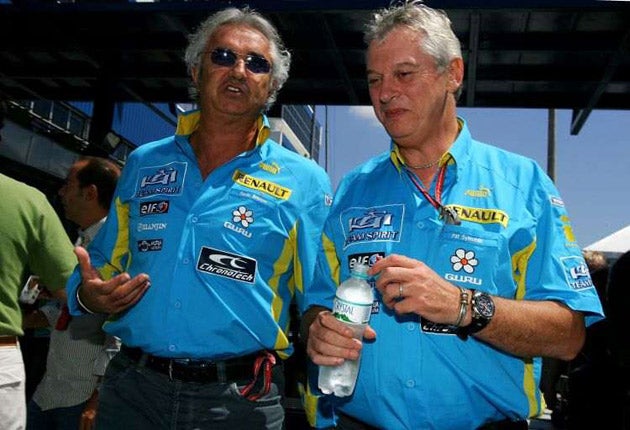Briatore pays the price for Renault's desperate gamble
Richard Rae reports on the day that saw F1 lose its most flamboyant figure – and its last vestige of respectability

Your support helps us to tell the story
From reproductive rights to climate change to Big Tech, The Independent is on the ground when the story is developing. Whether it's investigating the financials of Elon Musk's pro-Trump PAC or producing our latest documentary, 'The A Word', which shines a light on the American women fighting for reproductive rights, we know how important it is to parse out the facts from the messaging.
At such a critical moment in US history, we need reporters on the ground. Your donation allows us to keep sending journalists to speak to both sides of the story.
The Independent is trusted by Americans across the entire political spectrum. And unlike many other quality news outlets, we choose not to lock Americans out of our reporting and analysis with paywalls. We believe quality journalism should be available to everyone, paid for by those who can afford it.
Your support makes all the difference.Formula One motor racing was revealed yesterday as a sport in which cheats are not only cynical and ruthless, but are also apparently prepared to risk lives in their pursuit of success.
The Renault team's announcement that it would not contest charges that it "fixed" last year's Singapore Grand Prix was brief but the implications were stunning. Winning had apparently become so important to certain individuals at the top of the team that a young driver was told to crash so that his team-mate would have a better chance of coming first.
Renault, which has bases near Paris and Oxford, also confirmed that its team principal, Flavio Briatore, and engineering director, Pat Symonds, had left the team. In so doing, the pair appeared to effectively acknowledge that allegations made by a former Renault driver, Nelson Piquet Jnr – namely that Briatore and Symonds instructed him to deliberately drive his car into barriers so that team-mate Fernando Alonso would move to the head of the field, a charge Briatore denies – were true.
On Monday, Renault will appear before the World Motor Sport Council in Paris, at which it could be excluded from next year's Championship. It will hope that its actions in identifying and disassociating itself from the men alleged to be responsible make that punishment less likely to be imposed.
Piquet crashed two laps after Alonso came in for a routine pit-stop, which meant that while the safety car was out as the debris from the Brazilian's car was removed, Alonso was one of the few drivers who did not have to stop for fuel and tyres. The former world champion went on to take his first F1 victory in two years.
At the time, Piquet blamed the crash on a basic error but, after being dropped by the team after July's Hungarian GP, he and his father, a three-times world champion, spilled the beans to the sport's governing body, the Fédération Internationale de l'Automobile (FIA).
The initial response from Renault and Briatore was to threaten legal action, but with the mechanical telemetry of the incident apparently supporting Piquet's version of events, the team at least decided to acknowledge the inevitable and throw Briatore and Symonds to the wolves.
Many people within the sport will say the departure of the colourful and controversial Briatore has been a long time coming, because the former ski instructor has long been one of the sport's most powerful and, at the same time, controversial individuals.
The big financial breakthrough in what might be described as Briatore's unorthodox business career came as a fixer for the Benetton clothing company, when he was credited with establishing the brand in the US. He first became fully engaged with F1 when the clothing company bought the former Toleman team in 1991.
With Michael Schumacher at the wheel, Benetton won the F1 world championship in 1994 and 1995, in a car which at best pushed the borders of legality to the limit. After that, he was involved in several teams before Renault bought Benetton in 2000 and chose him to lead the team. After replacing Jenson Button with Alonso (one of several drivers Briatore also manages, taking a percentage of their earnings), world championships duly followed in 2005 and 2006.
Symonds has worked with Briatore for many years. The Englishman was Schumacher's race engineer in 1994 and, while Briatore dealt with the politics, Symonds became the man with overall responsibility for producing a winning car, as well as race tactics.
The extent of his involvement, as revealed in his faltering, nervous evidence to the FIA, comes as a surprise.
Given the FIA's reaction to other recent scandals in the sport, however, Renault must fear the worst. The McLaren team was fined $100m and stripped of all its manufacturers points for receiving technical information leaked from Ferrari in 2007.
Max Mosley, the departing head of the FIA, never got on well with Briatore, but there is also the matter of the team's 700 employees to consider. In the meantime, all the sport can do is suggest the fact the truth has emerged is evidence that, in the end, the cheats have not prospered.
Join our commenting forum
Join thought-provoking conversations, follow other Independent readers and see their replies
Comments